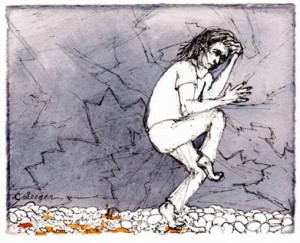
Sermons
Unity in the Kingdom of Christ - Ephesians 4:1-6
[caption id="attachment_4476" align="alignleft" width="300"] Pastor Uwe Heimowski[/caption]Crossroads Presbyterian Church has become a sister church to an Evangelical Free Church in Gera, Germany (located in what was the Communist-controlled area of East Germany) and to a Baptist Church located in Rostov-on-Don, Russia. The purpose of the “sisterhood” is to demonstrate the reconciliation that can be found only in Christ among three churches who have been enemies to each other. Crossroads joined this ‘sisterhood’ in 2014 and participated in a joint construction project at the Russian church location in May of 2014.Pastor Heimowski preached from Ephesians 4:1-6.How might the original recipients of Ephesians have been in need of unity? What things may have been causing discord among believers living in the Roman Empire?Economic disparity, ethnic differences, political differences…[caption id="attachment_4475" align="alignright" width="300"]
Pastor Uwe Heimowski[/caption]Crossroads Presbyterian Church has become a sister church to an Evangelical Free Church in Gera, Germany (located in what was the Communist-controlled area of East Germany) and to a Baptist Church located in Rostov-on-Don, Russia. The purpose of the “sisterhood” is to demonstrate the reconciliation that can be found only in Christ among three churches who have been enemies to each other. Crossroads joined this ‘sisterhood’ in 2014 and participated in a joint construction project at the Russian church location in May of 2014.Pastor Heimowski preached from Ephesians 4:1-6.How might the original recipients of Ephesians have been in need of unity? What things may have been causing discord among believers living in the Roman Empire?Economic disparity, ethnic differences, political differences…[caption id="attachment_4475" align="alignright" width="300"]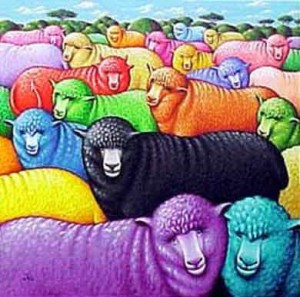 Black Sheep by Marsh[/caption]What did Pastor Uwe point out as three important aspects of unity according to the Apostle Paul?Godliness of lifeSimplicity of messageDeep faith in GodWhat verses from Ephesians did he use to support his points?Did any point in particular stand out as important to you?How did his message relate to the German-Russian-American Partnership?How might this message lead you to pray for the partnership?How might it relate to the congregation of Crossroads?
Black Sheep by Marsh[/caption]What did Pastor Uwe point out as three important aspects of unity according to the Apostle Paul?Godliness of lifeSimplicity of messageDeep faith in GodWhat verses from Ephesians did he use to support his points?Did any point in particular stand out as important to you?How did his message relate to the German-Russian-American Partnership?How might this message lead you to pray for the partnership?How might it relate to the congregation of Crossroads?
God's Anger for the Sake of Song - Zephaniah
[caption id="attachment_4525" align="alignleft" width="247"] The Prophet Zephaniah, 18th Century Russian Representation[/caption]Sing aloud, O daughter of Zion; shout, O Israel! Rejoice and exult with all your heart, O daughter of Jerusalem!15 The LORD has taken away the judgments against you; he has cleared away your enemies. The King of Israel, the LORD, is in your midst; you shall never again fear evil.16 On that day it shall be said to Jerusalem: "Fear not, O Zion; let not your hands grow weak.17 The LORD your God is in your midst, a mighty one who will save; he will rejoice over you with gladness; he will quiet you by his love; he will exult over you with loud singing.18 I will gather those of you who mourn for the festival, so that you will no longer suffer reproach.19 Behold, at that time I will deal with all your oppressors. And I will save the lame and gather the outcast, and I will change their shame into praise and renown in all the earth.20 At that time I will bring you in, at the time when I gather you together; for I will make you renowned and praised among all the peoples of the earth, when I restore your fortunes before your eyes," says the LORD.Zephaniah 3:14-20 ESV
The Prophet Zephaniah, 18th Century Russian Representation[/caption]Sing aloud, O daughter of Zion; shout, O Israel! Rejoice and exult with all your heart, O daughter of Jerusalem!15 The LORD has taken away the judgments against you; he has cleared away your enemies. The King of Israel, the LORD, is in your midst; you shall never again fear evil.16 On that day it shall be said to Jerusalem: "Fear not, O Zion; let not your hands grow weak.17 The LORD your God is in your midst, a mighty one who will save; he will rejoice over you with gladness; he will quiet you by his love; he will exult over you with loud singing.18 I will gather those of you who mourn for the festival, so that you will no longer suffer reproach.19 Behold, at that time I will deal with all your oppressors. And I will save the lame and gather the outcast, and I will change their shame into praise and renown in all the earth.20 At that time I will bring you in, at the time when I gather you together; for I will make you renowned and praised among all the peoples of the earth, when I restore your fortunes before your eyes," says the LORD.Zephaniah 3:14-20 ESV
We're on the Right Track - Amos 9:11-15
Amos 9:11-15 (ESV)11 "In that day I will raise upthe booth of David that is fallenand repair its breaches,and raise up its ruinsand rebuild it as in the days of old,12 that they may possess the remnant of Edomand all the nations who are called by my name,"declares the LORD who does this.13 "Behold, the days are coming," declares the LORD,"when the plowman shall overtake the reaperand the treader of grapes him who sows the seed;the mountains shall drip sweet wine,and all the hills shall flow with it.14 I will restore the fortunes of my people Israel,and they shall rebuild the ruined cities and inhabit them;they shall plant vineyards and drink their wine,and they shall make gardens and eat their fruit.15 I will plant them on their land,and they shall never again be uprootedout of the land that I have given them,"says the LORD your God.
No Justice, No Peace - Micah 5:1-6
Group Leaders: Please print off the following for group membersChoose 2-3 readers for the evening.[caption id="attachment_4431" align="alignleft" width="300"] Downton Abbey TV Series[/caption]Ask group members if they have a favorite TV series of all time. Who were minor characters who influenced the overall plot?Talk about what Tim means by saying that the Bible is a five season series and Micah is in Season 2. How does that help us understand the part we play?Read Micah 5:1-5Micah 5:5 says that the king born in Bethlehem shall be our peace.Explain how holistic that peace is by contrasting it with the chaos of the Assyrian in 5:1. How is Jesus’ peace the holistic solution to the holistic chaos brought by the Assyrian?Where have you experienced the chaos of the world most acutely in life? Religiously, politically, economically, socially? Tell a story about what that was like.Do you grasp that the peace of Jesus’ growing rule and ultimate victory a comfort in the midst of a chaotic world? Do you struggle to trust that Jesus’ peace is greater than the chaos? Do you struggle to accept that there is great chaos in this world?Micah and the other minor (as well as major) prophets write a great deal about God’s reign and his reign through the coming Messiah. This brings up the important whole-Bible theme of the Kingdom of God. Much of the following is taken from Christopher Wright’s excellent book Knowing Jesus Through the Old Testament.Read Luke 4:40-44There are three important ways to view the kingdom of God is spoken about in the Old Testament that is then assumed by Jesus Christ when he came preaching about it:Read Daniel 4:34-35 and Revelation 17:14The above passages speak of the first facet of the Kingdom of God…
Downton Abbey TV Series[/caption]Ask group members if they have a favorite TV series of all time. Who were minor characters who influenced the overall plot?Talk about what Tim means by saying that the Bible is a five season series and Micah is in Season 2. How does that help us understand the part we play?Read Micah 5:1-5Micah 5:5 says that the king born in Bethlehem shall be our peace.Explain how holistic that peace is by contrasting it with the chaos of the Assyrian in 5:1. How is Jesus’ peace the holistic solution to the holistic chaos brought by the Assyrian?Where have you experienced the chaos of the world most acutely in life? Religiously, politically, economically, socially? Tell a story about what that was like.Do you grasp that the peace of Jesus’ growing rule and ultimate victory a comfort in the midst of a chaotic world? Do you struggle to trust that Jesus’ peace is greater than the chaos? Do you struggle to accept that there is great chaos in this world?Micah and the other minor (as well as major) prophets write a great deal about God’s reign and his reign through the coming Messiah. This brings up the important whole-Bible theme of the Kingdom of God. Much of the following is taken from Christopher Wright’s excellent book Knowing Jesus Through the Old Testament.Read Luke 4:40-44There are three important ways to view the kingdom of God is spoken about in the Old Testament that is then assumed by Jesus Christ when he came preaching about it:Read Daniel 4:34-35 and Revelation 17:14The above passages speak of the first facet of the Kingdom of God…
- God’s Universal Reign: He reigns over the whole earth. He is king of nations and nature. The widest and most basic sense of the kingship of God in the Old Testament is this universal sovereignty.
Jesus, the divine-human (theanthropic) King, now exercises this same universal reign.Question: Are you resting in the reality of Jesus’ greater ability to bring peace than any other heavenly or earthly ruler?Read Psalm 146:7-10 and Matthew 6:9-10the above passages refer to a second facet on God’s Kingdom…
- God’s Redemptive and Theocratic Dimension: God’s Kingship over the whole earth is not acknowledged by all nations. However, Israel, through the covenant relationship, had accepted the rule of God over themselves. God was the acknowledged King in Israel…So, as well as the universal dimension of God’s kingship, the Old Testament has this very particular dimension. God’s covenant relationship with Israel was in a sense the relation of a king to his subjects…In the ancient world, it was the king’s job to protect his people from their enemies and to give them laws and good government….So the kingship of God in Israel had very practical, earthly effects. It was not just a theological item of belief. It was the authority of God as king which lay behind the specific details of Israel’s law. There was, therefore, a powerfully ethical thrust to the acknowledgement of God’s kingship. His reign was one of righteousness and justice, earthed in the real world of social, economic, and political relationships.
So when Jesus came proclaiming the kingdom of God, he was not talking about a place or an idea or an attitude. It was not just pie in the sky nor joy in the heart. The reality of God’s rule cannot be spiritualized into heaven (now or later) or privatized into individuals. Now of course it does have spiritual and personal dimensions which are fundamental also. But the term itself speaks of the aligning of human life on earth with the will of the divine government of God.Question: How might Jesus’ rule over the his international Kingdom impact the social, political, economic or religious systems of the places where his people are found?Read Micah 5:4-5 and Revelation 22:1-5The above passages refer to a third facet of the Kingdom of God…
- The Eschatological Dimension: We see in the Old Testament that the kingship of God was in one sense a universal sovereignty over all nations, nature and history. And that in another sense it meant the specific rule of God over Israel within the covenant relationship where his kingship was acknowledged. But God’s kingship, thirdly, came to be thought of in a future perspective also because neither of the first two senses was being realized in full. On the one hand it was obvious that the nations did not acknowledge Yahweh as King, and on the other hand it became increasingly and painfully obvious that even Israel, who acknowledged him as King, did not demonstrate it. He was king in name and title, but not obeyed in reality in the actual life of the nation.
So there developed the hope and expectation that at some time in the future God himself would intervene to establish his reign in its fullness over his people and over the world. God would come as king and put things right.Question: On a scale of 1 – 5 how much do you care that season 5 is about God putting everything right in the world? Are you bored by the idea? What can you do, by God’s grace, to “blow on the coals” of yours or others hope for this bright and beautiful future?
The Prophet Jonah
 Group Leaders: please print off copies for group participants. Choose two or three Scripture readers for the night.Opening Question: Has anyone used a certain memory device to memorize the order of the Minor Prophets? Have two or three people share their method with the others.Read Deuteronomy 13:1-6What are the criteria for distinguishing true from false prophets?How did Jesus pass that test as the true, and ultimate, Prophet? Can you point to a specific passage in the Gospels that highlights this?Read Deuteronomy 18:20-22What are the criteria for distinguishing true from false prophets?How did Jesus pass this test as the true, and ultimate, Prophet? Can you point to a specific passage in the Gospels that highlights this?Read Jonah 1:1-3Dr. Jack Collins writes that there are “3 characteristics of a prophet: 1/ direct personal communication from God; 2/ the message concerns the things of God, and his kingdom (in my terms, the corporate entity and its mission in the world); 3/ he faithfully recorded or uttered the revelation he received.”How did Jonah meet the above characteristics? Which characteristic did he fail to meet?Dr. Douglas Stuart notes that Old Testament prophets “considered themselves as occupying a divinely appointed societal office, correcting illegal beliefs and practices.”Can you think of people in American society who have this sort of role? Who would they be? How are they like or unlike the Old Testament prophet?Read Matthew 28:18-20We are not all called to be prophets, uttering direct revelation from God. Try to describe the characteristics of the rank and file Christian based on Jesus’ commission to the apostles.How is this different than having the role of a prophet?Who can name the major roles that God has chosen for you to play in life.Tell a story of when you sense that you have done a poor job fulfilling your role.Tell a story of when you sense that you have done a good job at fulfilling your role.Do you have joy in your heart about how God is using your service to him?
Group Leaders: please print off copies for group participants. Choose two or three Scripture readers for the night.Opening Question: Has anyone used a certain memory device to memorize the order of the Minor Prophets? Have two or three people share their method with the others.Read Deuteronomy 13:1-6What are the criteria for distinguishing true from false prophets?How did Jesus pass that test as the true, and ultimate, Prophet? Can you point to a specific passage in the Gospels that highlights this?Read Deuteronomy 18:20-22What are the criteria for distinguishing true from false prophets?How did Jesus pass this test as the true, and ultimate, Prophet? Can you point to a specific passage in the Gospels that highlights this?Read Jonah 1:1-3Dr. Jack Collins writes that there are “3 characteristics of a prophet: 1/ direct personal communication from God; 2/ the message concerns the things of God, and his kingdom (in my terms, the corporate entity and its mission in the world); 3/ he faithfully recorded or uttered the revelation he received.”How did Jonah meet the above characteristics? Which characteristic did he fail to meet?Dr. Douglas Stuart notes that Old Testament prophets “considered themselves as occupying a divinely appointed societal office, correcting illegal beliefs and practices.”Can you think of people in American society who have this sort of role? Who would they be? How are they like or unlike the Old Testament prophet?Read Matthew 28:18-20We are not all called to be prophets, uttering direct revelation from God. Try to describe the characteristics of the rank and file Christian based on Jesus’ commission to the apostles.How is this different than having the role of a prophet?Who can name the major roles that God has chosen for you to play in life.Tell a story of when you sense that you have done a poor job fulfilling your role.Tell a story of when you sense that you have done a good job at fulfilling your role.Do you have joy in your heart about how God is using your service to him?

Genesis 50:22-Exodus 1:14
Genesis 50:22–Exodus 1:14 22 So Joseph remained in Egypt, he and his father's house. Joseph lived 110 years. 23 And Joseph saw Ephraim's children of the third generation. The children also of Machir the son of Manasseh were counted as Joseph's own. 24 And Joseph said to his brothers, "I am about to die, but God will visit you and bring you up out of this land to the land that he swore to Abraham, to Isaac, and to Jacob." 25 Then Joseph made the sons of Israel swear, saying, "God will surely visit you, and you shall carry up my bones from here." 26 So Joseph died, being 110 years old. They embalmed him, and he was put in a coffin in Egypt. Exodus 1:1 These are the names of the sons of Israel who came to Egypt with Jacob, each with his household: 2 Reuben, Simeon, Levi, and Judah, 3 Issachar, Zebulun, and Benjamin, 4 Dan and Naphtali, Gad and Asher. 5 All the descendants of Jacob were seventy persons; Joseph was already in Egypt. 6 Then Joseph died, and all his brothers and all that generation. 7 But the people of Israel were fruitful and increased greatly; they multiplied and grew exceedingly strong, so that the land was filled with them.8 Now there arose a new king over Egypt, who did not know Joseph. 9 And he said to his people, “Behold, the people of Israel are too many and too mighty for us. 10 Come, let us deal shrewdly with them, lest they multiply, and, if war breaks out, they join our enemies and fight against us and escape from the land.” 11 Therefore they set taskmasters over them to afflict them with heavy burdens. They built for Pharaoh store cities, Pithom and Raamses. 12 But the more they were oppressed, the more they multiplied and the more they spread abroad. And the Egyptians were in dread of the people of Israel. 13 So they ruthlessly made the people of Israel work as slaves 14 and made their lives bitter with hard service, in mortar and brick, and in all kinds of work in the field. In all their work they ruthlessly made them work as slaves.
We Are Special
Choose two or three designated readers for the night. The group leader will call on them to read the suggested passages.Please print off enough questions for individuals in your group to have in front of them.If you could talk about one point from the sermon this evening what would it be?[caption id="attachment_4385" align="alignleft" width="445"]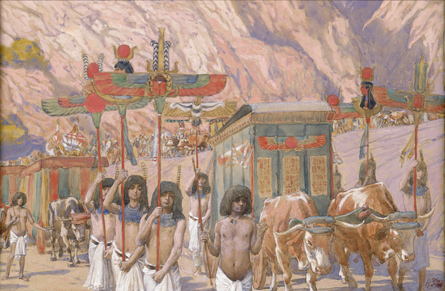 Jacob's Body is Taken to Canaan, by James Tissot, c. 1902[/caption]Read Genesis 49:29-33Why does Jacob deeply desire to be buried in Canaan? Craft your answer making use of the covenant with Abraham.The original audience of Genesis was the Exodus community heading toward Canaan from Egypt. They are the fulfillment of Jacob’s deep longing for the fulfillment of God’s promise of land. Why would this story of Jacob’s burial help them to realize that they were a special people living in a special time?Read Exodus 19:1-6[caption id="attachment_4386" align="alignright" width="247"]
Jacob's Body is Taken to Canaan, by James Tissot, c. 1902[/caption]Read Genesis 49:29-33Why does Jacob deeply desire to be buried in Canaan? Craft your answer making use of the covenant with Abraham.The original audience of Genesis was the Exodus community heading toward Canaan from Egypt. They are the fulfillment of Jacob’s deep longing for the fulfillment of God’s promise of land. Why would this story of Jacob’s burial help them to realize that they were a special people living in a special time?Read Exodus 19:1-6[caption id="attachment_4386" align="alignright" width="247"]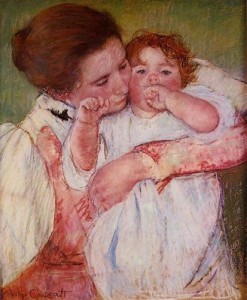 Little Ann Sucking Her Finger Embraced by Her Mother, by Mary Cassatt 1897[/caption]God’s covenanting people are said to be God’s treasured possession.To what extent do you grasp how special the Church is to Jesus Christ?Priests, in the Old Testament, were to bring God to the people and the people to God.As a “kingdom of priests” how were these special people to function in relation to their national neighbors?Do special roles and service always go together where you live, work and play? For example: is it the teacher’s pet who is also expected to be the servant of all the other students?Read Deuteronomy 9:4-6Does God account for our sinfulness when he affirms that we are special to him?How does Oprah Winfrey (or cultural figures similar to her) typically affirm that people are special? How is sin affirmed or not affirmed by those figures?We are also special because of the time in which we lived. Our people have longed for millennia when the age of the Messiah would come. That is the time we now are in.Read Hebrews 9:23-28How does the author to the Hebrews refer to the time in which we are living?What promises to the people of God have been fulfilled, according to this passage?[caption id="attachment_4388" align="alignleft" width="399"]
Little Ann Sucking Her Finger Embraced by Her Mother, by Mary Cassatt 1897[/caption]God’s covenanting people are said to be God’s treasured possession.To what extent do you grasp how special the Church is to Jesus Christ?Priests, in the Old Testament, were to bring God to the people and the people to God.As a “kingdom of priests” how were these special people to function in relation to their national neighbors?Do special roles and service always go together where you live, work and play? For example: is it the teacher’s pet who is also expected to be the servant of all the other students?Read Deuteronomy 9:4-6Does God account for our sinfulness when he affirms that we are special to him?How does Oprah Winfrey (or cultural figures similar to her) typically affirm that people are special? How is sin affirmed or not affirmed by those figures?We are also special because of the time in which we lived. Our people have longed for millennia when the age of the Messiah would come. That is the time we now are in.Read Hebrews 9:23-28How does the author to the Hebrews refer to the time in which we are living?What promises to the people of God have been fulfilled, according to this passage?[caption id="attachment_4388" align="alignleft" width="399"]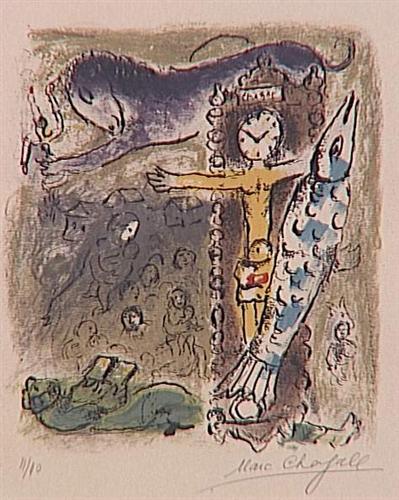 Christ as a Clock, by Marc Chagall, 1957[/caption]What promise are we still awaiting to be fulfilled in the future?Do you live with an awareness of living at such a special time?Do you sense any competition with that awareness? For example, do you feel more special because you are living in the technological age than because you are living in the “end of the ages”? Do you feel more special because you get to participate in the age of America or the age of the fulfillment of God’s promises to Abraham? Others?What practices or habits in your life are serving to fuel Christ’s competition?How does attending this Care Group help you to know your specialness to God, to the world and the specialness of the time in which you live?What other practices in your life serve to further your appreciation for the specialness of being in Christ?
Christ as a Clock, by Marc Chagall, 1957[/caption]What promise are we still awaiting to be fulfilled in the future?Do you live with an awareness of living at such a special time?Do you sense any competition with that awareness? For example, do you feel more special because you are living in the technological age than because you are living in the “end of the ages”? Do you feel more special because you get to participate in the age of America or the age of the fulfillment of God’s promises to Abraham? Others?What practices or habits in your life are serving to fuel Christ’s competition?How does attending this Care Group help you to know your specialness to God, to the world and the specialness of the time in which you live?What other practices in your life serve to further your appreciation for the specialness of being in Christ?
The Lion of Judah - Genesis 49:1-28
[caption id="attachment_4372" align="alignright" width="200"] Lion and cub[/caption]Genesis 49:1-28 contain some of the last words of our patriarch Jacob. What would you like your last words to be? What would you hate for your last words to be?
Lion and cub[/caption]Genesis 49:1-28 contain some of the last words of our patriarch Jacob. What would you like your last words to be? What would you hate for your last words to be?
 Oxen Yoked with Burden[/caption]
Oxen Yoked with Burden[/caption]The Rock was Christ - Exodus 17:1-7
[caption id="attachment_4336" align="alignleft" width="300"]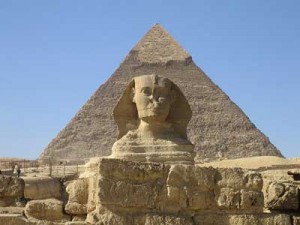 Pyramid and Sphinx[/caption]Our passage this week features the people of God after leaving Egypt in the Exodus. Talk about an aspect of Egyptian history that you find particularly interesting. For example the pyramids, the Sphinx, mummies, the Nile, Coptic Orthodoxy, etc.Rev. Muldoon said that the Israeilites were failing to let God be God. Considering the larger sweep of the story of the Exodus up to this point and then 17:1-3 how is it that they are failing to do this? Why is this a sin? What would it mean for them to allow God to be God? Why would this be better?This can be applied to how we treat one another as God’s image-bearers also. Why is it important that we allow other people to be who they are rather than to be someone/thing else? How could doing so honor God?
Pyramid and Sphinx[/caption]Our passage this week features the people of God after leaving Egypt in the Exodus. Talk about an aspect of Egyptian history that you find particularly interesting. For example the pyramids, the Sphinx, mummies, the Nile, Coptic Orthodoxy, etc.Rev. Muldoon said that the Israeilites were failing to let God be God. Considering the larger sweep of the story of the Exodus up to this point and then 17:1-3 how is it that they are failing to do this? Why is this a sin? What would it mean for them to allow God to be God? Why would this be better?This can be applied to how we treat one another as God’s image-bearers also. Why is it important that we allow other people to be who they are rather than to be someone/thing else? How could doing so honor God? Psalms were originally given to God’s people to be sung as a community. In this way the words would be owned and embodied by the people at appropriate times. Read Psalm 88. Why is this not teaching God's people to grumble? How is this different from what Israel did in Exodus 17?Is there a difference between grumbling and complaining or lamenting? What is it?Rev. Muldoon said that “all sin must be punished.” How did Exodus 17 prefigure how the sin of God’s people would be punished?[caption id="attachment_4335" align="alignright" width="300"]
Psalms were originally given to God’s people to be sung as a community. In this way the words would be owned and embodied by the people at appropriate times. Read Psalm 88. Why is this not teaching God's people to grumble? How is this different from what Israel did in Exodus 17?Is there a difference between grumbling and complaining or lamenting? What is it?Rev. Muldoon said that “all sin must be punished.” How did Exodus 17 prefigure how the sin of God’s people would be punished?[caption id="attachment_4335" align="alignright" width="300"] Big Electric Chair by Andy Warhol, 1967[/caption]Read Paul’s letter to the Colossians 2:13-14. How many sins are we responsible for now or in the future?How does Colossians 2:13-14 help you to understand that your relationship with God is based on what Jesus has done rather than what you do? How might this give us freedom in the way that we covenantally-relate with God day-to-day? Try to give a specific and concrete example.
Big Electric Chair by Andy Warhol, 1967[/caption]Read Paul’s letter to the Colossians 2:13-14. How many sins are we responsible for now or in the future?How does Colossians 2:13-14 help you to understand that your relationship with God is based on what Jesus has done rather than what you do? How might this give us freedom in the way that we covenantally-relate with God day-to-day? Try to give a specific and concrete example.
Disturbing the Peace? - Genesis 41:50-45
1. We've heard about Joseph's and others dreams the past few weeks. Not to say your dream was intended to tell the future, but what is an interesting dream you've had in your life? Do you remember the characters, setting and plot? Describe for the group.2. Were you disturbed or comforted by the message that God will disturb false peace in order to achieve true peace?3. What is "false peace"?4. What, then, is "true peace"?5. How does this help to make sense out of Jesus' teaching that "blessed are the peacemakers for they shall be called sons of God"?6. How is it true that we are like our Father (sons of God) when we seek reconciliation? Restricting ourselves to Genesis, how has God shown he wants reconciliation in history?7. Have you ever known someone who would rather live with false peace than pursue true peace through reconciliation?8. Have you seen reconciliation happen in a church?9. Have you tried and succeeded or failed in true peacemaking? How?10. Why is peacemaking a particularly important aspect of adult Spirit-ual formation?11. Do you see where God might be graciously working events so that you might pursue true peace in conflicted relationships?
Genesis 41:1-57
41 When two full years had passed, Pharaoh had a dream: He was standing by the Nile, 2 when out of the river there came up seven cows, sleek and fat, and they grazed among the reeds. 3 After them, seven other cows, ugly and gaunt, came up out of the Nile and stood beside those on the riverbank. 4 And the cows that were ugly and gaunt ate up the seven sleek, fat cows. Then Pharaoh woke up.
5 He fell asleep again and had a second dream: Seven heads of grain, healthy and good, were growing on a single stalk. 6 After them, seven other heads of grain sprouted—thin and scorched by the east wind. 7 The thin heads of grain swallowed up the seven healthy, full heads. Then Pharaoh woke up; it had been a dream.8 In the morning his mind was troubled, so he sent for all the magicians and wise men of Egypt. Pharaoh told them his dreams, but no one could interpret them for him.9 Then the chief cupbearer said to Pharaoh, “Today I am reminded of my shortcomings. 10 Pharaoh was once angry with his servants, and he imprisoned me and the chief baker in the house of the captain of the guard. 11 Each of us had a dream the same night, and each dream had a meaning of its own. 12 Now a young Hebrew was there with us, a servant of the captain of the guard. We told him our dreams, and he interpreted them for us, giving each man the interpretation of his dream. 13 And things turned out exactly as he interpreted them to us: I was restored to my position, and the other man was impaled.”14 So Pharaoh sent for Joseph, and he was quickly brought from the dungeon. When he had shaved and changed his clothes, he came before Pharaoh.15 Pharaoh said to Joseph, “I had a dream, and no one can interpret it. But I have heard it said of you that when you hear a dream you can interpret it.”16 “I cannot do it,” Joseph replied to Pharaoh, “but God will give Pharaoh the answer he desires.”17 Then Pharaoh said to Joseph, “In my dream I was standing on the bank of the Nile, 18 when out of the river there came up seven cows, fat and sleek, and they grazed among the reeds. 19 After them, seven other cows came up—scrawny and very ugly and lean. I had never seen such ugly cows in all the land of Egypt. 20 The lean, ugly cows ate up the seven fat cows that came up first. 21 But even after they ate them, no one could tell that they had done so; they looked just as ugly as before. Then I woke up.22 “In my dream I saw seven heads of grain, full and good, growing on a single stalk. 23 After them, seven other heads sprouted—withered and thin and scorched by the east wind. 24 The thin heads of grain swallowed up the seven good heads. I told this to the magicians, but none of them could explain it to me.”25 Then Joseph said to Pharaoh, “The dreams of Pharaoh are one and the same. God has revealed to Pharaoh what he is about to do. 26 The seven good cows are seven years, and the seven good heads of grain are seven years; it is one and the same dream. 27 The seven lean, ugly cows that came up afterward are seven years, and so are the seven worthless heads of grain scorched by the east wind: They are seven years of famine.28 “It is just as I said to Pharaoh: God has shown Pharaoh what he is about to do. 29 Seven years of great abundance are coming throughout the land of Egypt, 30 but seven years of famine will follow them. Then all the abundance in Egypt will be forgotten, and the famine will ravage the land. 31 The abundance in the land will not be remembered, because the famine that follows it will be so severe. 32 The reason the dream was given to Pharaoh in two forms is that the matter has been firmly decided by God, and God will do it soon.33 “And now let Pharaoh look for a discerning and wise man and put him in charge of the land of Egypt. 34 Let Pharaoh appoint commissioners over the land to take a fifth of the harvest of Egypt during the seven years of abundance. 35 They should collect all the food of these good years that are coming and store up the grain under the authority of Pharaoh, to be kept in the cities for food. 36 This food should be held in reserve for the country, to be used during the seven years of famine that will come upon Egypt, so that the country may not be ruined by the famine.”37 The plan seemed good to Pharaoh and to all his officials. 38 So Pharaoh asked them, “Can we find anyone like this man, one in whom is the spirit of God?”39 Then Pharaoh said to Joseph, “Since God has made all this known to you, there is no one so discerning and wise as you. 40 You shall be in charge of my palace, and all my people are to submit to your orders. Only with respect to the throne will I be greater than you.”
Joseph in Charge of Egypt
41 So Pharaoh said to Joseph, “I hereby put you in charge of the whole land of Egypt.” 42 Then Pharaoh took his signet ring from his finger and put it on Joseph’s finger. He dressed him in robes of fine linen and put a gold chain around his neck. 43 He had him ride in a chariot as his second-in-command, and people shouted before him, “Make way!” Thus he put him in charge of the whole land of Egypt.44 Then Pharaoh said to Joseph, “I am Pharaoh, but without your word no one will lift hand or foot in all Egypt.” 45 Pharaoh gave Joseph the name Zaphenath-Paneah and gave him Asenath daughter of Potiphera, priest of On, to be his wife. And Joseph went throughout the land of Egypt.46 Joseph was thirty years old when he entered the service of Pharaoh king of Egypt. And Joseph went out from Pharaoh’s presence and traveled throughout Egypt. 47 During the seven years of abundance the land produced plentifully. 48 Joseph collected all the food produced in those seven years of abundance in Egypt and stored it in the cities. In each city he put the food grown in the fields surrounding it. 49 Joseph stored up huge quantities of grain, like the sand of the sea; it was so much that he stopped keeping records because it was beyond measure.50 Before the years of famine came, two sons were born to Joseph by Asenath daughter of Potiphera, priest of On. 51 Joseph named his firstborn Manasseh and said, “It is because God has made me forget all my trouble and all my father’s household.” 52 The second son he named Ephraim and said, “It is because God has made me fruitful in the land of my suffering.”53 The seven years of abundance in Egypt came to an end, 54 and the seven years of famine began, just as Joseph had said. There was famine in all the other lands, but in the whole land of Egypt there was food. 55 When all Egypt began to feel the famine, the people cried to Pharaoh for food. Then Pharaoh told all the Egyptians, “Go to Joseph and do what he tells you.”56 When the famine had spread over the whole country, Joseph opened all the storehouses and sold grain to the Egyptians, for the famine was severe throughout Egypt. 57 And all the world came to Egypt to buy grain from Joseph, because the famine was severe everywhere.
God and the Earth's Future - 2 Peter 3:3-13
[caption id="attachment_4291" align="alignright" width="253"] Rainbow, by Billy Apple, 1965[/caption]Last week’s sermon focused on God’s promise to restore and transform the earth by smelting away the impurity of sin at the return of Jesus from heaven (a Restorationist view). This is in contrast to the popular view that God’s relationship with the earth will end when he totally destroys it at Christ's return creating a different one afterwards (an Annihilationist view). First we looked at the big picture, noting how a Restorationist view does better justice to the unfolding drama of creation, human rebellion, and redemption. We were created into a web of good relationships that were broken by human rebellion. God is in the business of destroying sin and Satan in the efforts to redeem his good work of creation, which includes human beings. On an annihilationist view the relationship between God and the earth is lost, Satan has corrupted and marred the earth and gets what he always wanted – ultimate destruction of God’s good work of creation.We then looked at 2 Peter 3:3-13. Noting that Peter is making a comparison between the Flood in Noah’s day and the coming judgment of the ungodly we concluded that the future judgment is not a destruction of God’s good work of creation but “destruction of the ungodly” (v. 7). The extreme heat and burning will be of all evil and effects of death thereby restoring and even transforming creation into the place where righteousness will be established forever (v. 13).
Rainbow, by Billy Apple, 1965[/caption]Last week’s sermon focused on God’s promise to restore and transform the earth by smelting away the impurity of sin at the return of Jesus from heaven (a Restorationist view). This is in contrast to the popular view that God’s relationship with the earth will end when he totally destroys it at Christ's return creating a different one afterwards (an Annihilationist view). First we looked at the big picture, noting how a Restorationist view does better justice to the unfolding drama of creation, human rebellion, and redemption. We were created into a web of good relationships that were broken by human rebellion. God is in the business of destroying sin and Satan in the efforts to redeem his good work of creation, which includes human beings. On an annihilationist view the relationship between God and the earth is lost, Satan has corrupted and marred the earth and gets what he always wanted – ultimate destruction of God’s good work of creation.We then looked at 2 Peter 3:3-13. Noting that Peter is making a comparison between the Flood in Noah’s day and the coming judgment of the ungodly we concluded that the future judgment is not a destruction of God’s good work of creation but “destruction of the ungodly” (v. 7). The extreme heat and burning will be of all evil and effects of death thereby restoring and even transforming creation into the place where righteousness will be established forever (v. 13). What do you find most beautiful about God’s creation during this Autumn season?If the sermon was to have been abbreviated to one or two quick points which ones would you say should be included no matter what?In Genesis 9:13 what is included in the covenant that God made with Noah? How does this illustrate the relationship between God and the earth?Acts 3:18-21 – How much will be restored by the Spirit when Jesus returns?Romans 8:19-25 – What is presented as groaning with human beings it longs for God’s redemption from the effects of sin?Colossians 1:15-20 – How much was created through Christ? How much is restored through Christ’s death and resurrection?In 1 John 3:8b the Apostle writes that “the reason the Son of God appeared was to destroy the works of the devil.” Whose works did the Son of God not come to destroy?God has obviously placed a value on his good work of creation. Should creations value be measured by God or by humanity?[caption id="attachment_4293" align="alignright" width="300"]
What do you find most beautiful about God’s creation during this Autumn season?If the sermon was to have been abbreviated to one or two quick points which ones would you say should be included no matter what?In Genesis 9:13 what is included in the covenant that God made with Noah? How does this illustrate the relationship between God and the earth?Acts 3:18-21 – How much will be restored by the Spirit when Jesus returns?Romans 8:19-25 – What is presented as groaning with human beings it longs for God’s redemption from the effects of sin?Colossians 1:15-20 – How much was created through Christ? How much is restored through Christ’s death and resurrection?In 1 John 3:8b the Apostle writes that “the reason the Son of God appeared was to destroy the works of the devil.” Whose works did the Son of God not come to destroy?God has obviously placed a value on his good work of creation. Should creations value be measured by God or by humanity?[caption id="attachment_4293" align="alignright" width="300"] The Girl with the Mushroom Under the Rainbow, by Konstantin Somav, 1922[/caption]How is creation’s value to God different from or the same as its value to humans?
The Girl with the Mushroom Under the Rainbow, by Konstantin Somav, 1922[/caption]How is creation’s value to God different from or the same as its value to humans?
Take One For the Team - Genesis 39
(LEADER) Garments have played a prominent role in the last three chapters of Genesis (Joseph’s coat, Tamar’s veil, and Joseph’s garment taken by Potiphar’s wife). Ask a few people to tell stories from their lives when clothing played a key role. (Ex. disagreements with parents about what to wear; the first time they tried to dress themselves; strange things they wore; clothes they had to wear for work that they wouldn’t be caught dead in; etc.)(LEADER) What’s one thing from last weekend’s message that you hope to talk about as a group?Invite someone to read Genesis 12:1-3(LEADER) How is the LORD’s choosing, or electing, evident in this passage?(LEADER) Keeping in mind Genesis 3-11, how is God’s choosing Abraham gracious? Was humanity interested in bearing God’s image throughout the earth? (Remember that Abraham was part of cultural project of Genesis 11:1-9).Invite someone to read the following quote: “Israel, the people of Abraham, was conscious of a unique role and status among the nations given to them by God in his act of choosing and calling Abraham. Certain things were true of them that were not true of other peoples. God did certain things in relation to them that he did not do to others. Much was demanded of them that was not, in quite the same way, demanded of others. Great was their privilege. Greater still was their responsibility.” from The Mission of God by Christopher J. H. WrightInvite someone to read Genesis 39:1-12(LEADER) How did God work through Joseph, one of Abraham’s offspring, to fulfill his promise to bring blessing to the nations? How did Joseph bless Potiphar by refusing his wife?(LEADER) How has God been using you to be a blessing to others, even if they are not part of the Church? Be concrete and specific. (examples include in-laws; friend at the water cooler; Panera; Christmas-time; tax season; etc)Invite someone to read 1 Peter 2:19-25(LEADER) How do the Apostle Peter’s words clarify that God’s gracious election of us means sometimes “taking one for the team”?(LEADER) How is it most true in the life of our Christ our Savior?(LEADER) Where have you experienced difficulty in relationship with others because of your commitment to God’s agenda?(LEADER) How could God still use that to further help the Church or even those who caused you difficulty?
Geared for the Weak - Genesis 38
[caption id="attachment_4263" align="alignright" width="191"]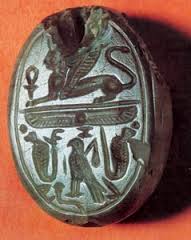 Jezebel's Royal Seal in the Israel Museum, Jerusalem[/caption]Dr. John Walton, of Wheaton University, writes, “Judah’s guarantee of payment for his act of prostitution is his seal, cord, and staff. The seal is most likely a stamp seal engraved with a design that would uniquely identify Judah. It would be used by him for any transaction or correspondence much as we use a signature today… Seals were often worn around the neck on a cord…his staff is a walking stick but may have been a symbol of authority in his clan. If so, Tamar holds in her possession symbols of his individual and corporate identity – in modern terms, items akin to someone’s driver’s license” (The NIV Application Commentary: Genesis, 669).(LEADER) Enter into the story of Genesis 38 and get to know each other better by asking willing participants to pass their license around to the other participants. Ask them to tell a story about when they had their picture, what the DMV was like, or something like that.(If anyone is interested in having a good reference book on the cultural background of the Old Testament they can purchase the IVP Bible Background Commentary edited by Walton, Matthews and Chavalas.)Everybody quietly read Genesis 38:1-11.(LEADER) Ask if anyone can explain how the powerful (Judah and his sons) in those verses are keeping the less powerful (Tamar) in a position of weakness. How are the powerful displayed as not giving the weak the benefit of the doubt?Everybody quietly read Genesis 38:12-30.(LEADER) Ask if anyone can recall how the passage displays God gearing his kingdom for the sake of the weak (Tamar).(LEADER) Ask which systems today (work, family, society, church, economy, sports, etc.) are geared toward those in power? Which systems are geared toward those who are not in the positions of power?(LEADER) Matthew 1:2-6 mentions that Tamar, as well as Gentile-women like Rahab and Ruth, are part of Jesus’ family line. What does this tell you about how God uses weakness and powerlessness in his kingdom? How does this give you hope?(LEADER) As the Apostle Paul neared the end of his life, he wrote to his protégé
Jezebel's Royal Seal in the Israel Museum, Jerusalem[/caption]Dr. John Walton, of Wheaton University, writes, “Judah’s guarantee of payment for his act of prostitution is his seal, cord, and staff. The seal is most likely a stamp seal engraved with a design that would uniquely identify Judah. It would be used by him for any transaction or correspondence much as we use a signature today… Seals were often worn around the neck on a cord…his staff is a walking stick but may have been a symbol of authority in his clan. If so, Tamar holds in her possession symbols of his individual and corporate identity – in modern terms, items akin to someone’s driver’s license” (The NIV Application Commentary: Genesis, 669).(LEADER) Enter into the story of Genesis 38 and get to know each other better by asking willing participants to pass their license around to the other participants. Ask them to tell a story about when they had their picture, what the DMV was like, or something like that.(If anyone is interested in having a good reference book on the cultural background of the Old Testament they can purchase the IVP Bible Background Commentary edited by Walton, Matthews and Chavalas.)Everybody quietly read Genesis 38:1-11.(LEADER) Ask if anyone can explain how the powerful (Judah and his sons) in those verses are keeping the less powerful (Tamar) in a position of weakness. How are the powerful displayed as not giving the weak the benefit of the doubt?Everybody quietly read Genesis 38:12-30.(LEADER) Ask if anyone can recall how the passage displays God gearing his kingdom for the sake of the weak (Tamar).(LEADER) Ask which systems today (work, family, society, church, economy, sports, etc.) are geared toward those in power? Which systems are geared toward those who are not in the positions of power?(LEADER) Matthew 1:2-6 mentions that Tamar, as well as Gentile-women like Rahab and Ruth, are part of Jesus’ family line. What does this tell you about how God uses weakness and powerlessness in his kingdom? How does this give you hope?(LEADER) As the Apostle Paul neared the end of his life, he wrote to his protégé  Timothy, “All Scripture is breathed out by God” (2 Timothy 3:16). Genesis 38 is a passage which refers to a variety of sexual activity. Explain why this is a good thing for the people of God to know. How is this a resource to families? Ask if any members have wisdom about how to discuss sexual activity to children and teens. Ask if any would like to share a story of how they learned about these things.
Timothy, “All Scripture is breathed out by God” (2 Timothy 3:16). Genesis 38 is a passage which refers to a variety of sexual activity. Explain why this is a good thing for the people of God to know. How is this a resource to families? Ask if any members have wisdom about how to discuss sexual activity to children and teens. Ask if any would like to share a story of how they learned about these things.
Genesis 37:2-36
2 This is the account of Jacob’s family line. Joseph, a young man of seventeen, was tending the flocks with his brothers, the sons of Bilhah and the sons of Zilpah, his father’s wives, and he brought their father a bad report about them.3 Now Israel loved Joseph more than any of his other sons, because he had been born to him in his old age; and he made an ornate robe for him. 4 When his brothers saw that their father loved him more than any of them, they hated him and could not speak a kind word to him. 5 Joseph had a dream, and when he told it to his brothers, they hated him all the more. 6 He said to them, “Listen to this dream I had: 7 We were binding sheaves of grain out in the field when suddenly my sheaf rose and stood upright, while your sheaves gathered around mine and bowed down to it.” 8 His brothers said to him, “Do you intend to reign over us? Will you actually rule us?” And they hated him all the more because of his dream and what he had said.9 Then he had another dream, and he told it to his brothers. “Listen,” he said, “I had another dream, and this time the sun and moon and eleven stars were bowing down to me.” 10 When he told his father as well as his brothers, his father rebuked him and said, “What is this dream you had? Will your mother and I and your brothers actually come and bow down to the ground before you?” 11 His brothers were jealous of him, but his father kept the matter in mind.12 Now his brothers had gone to graze their father’s flocks near Shechem, 13 and Israel said to Joseph, “As you know, your brothers are grazing the flocks near Shechem. Come, I am going to send you to them.” “Very well,” he replied. 14 So he said to him, “Go and see if all is well with your brothers and with the flocks, and bring word back to me.” Then he sent him off from the Valley of Hebron.When Joseph arrived at Shechem, 15 a man found him wandering around in the fields and asked him, “What are you looking for?” 16 He replied, “I’m looking for my brothers. Can you tell me where they are grazing their flocks?” 17 “They have moved on from here,” the man answered. “I heard them say, ‘Let’s go to Dothan.’” So Joseph went after his brothers and found them near Dothan.18 But they saw him in the distance, and before he reached them, they plotted to kill him. 19 “Here comes that dreamer!” they said to each other. 20 “Come now, let’s kill him and throw him into one of these cisterns and say that a ferocious animal devoured him. Then we’ll see what comes of his dreams.” 21 When Reuben heard this, he tried to rescue him from their hands. “Let’s not take his life,” he said. 22 “Don’t shed any blood. Throw him into this cistern here in the wilderness, but don’t lay a hand on him.” Reuben said this to rescue him from them and take him back to his father. 23 So when Joseph came to his brothers, they stripped him of his robe—the ornate robe he was wearing— 24 and they took him and threw him into the cistern. The cistern was empty; there was no water in it.25 As they sat down to eat their meal, they looked up and saw a caravan of Ishmaelites coming from Gilead. Their camels were loaded with spices, balm and myrrh, and they were on their way to take them down to Egypt. 26 Judah said to his brothers, “What will we gain if we kill our brother and cover up his blood? 27 Come, let’s sell him to the Ishmaelites and not lay our hands on him; after all, he is our brother, our own flesh and blood.” His brothers agreed. 28 So when the Midianite merchants came by, his brothers pulled Joseph up out of the cistern and sold him for twenty shekels of silver to the Ishmaelites, who took him to Egypt.29 When Reuben returned to the cistern and saw that Joseph was not there, he tore his clothes. 30 He went back to his brothers and said, “The boy isn’t there! Where can I turn now?” 31 Then they got Joseph’s robe, slaughtered a goat and dipped the robe in the blood. 32 They took the ornate robe back to their father and said, “We found this. Examine it to see whether it is your son’s robe.” 33 He recognized it and said, “It is my son’s robe! Some ferocious animal has devoured him. Joseph has surely been torn to pieces.” 34 Then Jacob tore his clothes, put on sackcloth and mourned for his son many days. 35 All his sons and daughters came to comfort him, but he refused to be comforted. “No,” he said, “I will continue to mourn until I join my son in the grave.” So his father wept for him. 36 Meanwhile, the Midianites sold Joseph in Egypt to Potiphar, one of Pharaoh’s officials, the captain of the guard.
Dynamically Living with God - Genesis 35:1-15
 Jacob’s name change to Israel is re-affirmed in Genesis 35. “What is the background of your name? Why were you given your name? Were you, for instance, named after a relative, family friend, biblical character, athlete, movie star?” (taken from Dan Allender’s To Be Told)
Jacob’s name change to Israel is re-affirmed in Genesis 35. “What is the background of your name? Why were you given your name? Were you, for instance, named after a relative, family friend, biblical character, athlete, movie star?” (taken from Dan Allender’s To Be Told)
- The Christian life is a dynamic one where we, as God’s people, are meant to interact with God in intimate covenant communion for the sake of the building of the Kingdom of his Son Jesus Christ. We saw this in the relationship between Jacob and God Almighty (El Shaddai) in Genesis 35. First God instructed Jacob how to relate to him, Jacob/Israel obeyed and then God met him again in a revealing of his promises to Israel for personal communion and kingdom building.
- The promises made to Jacob/Israel in Genesis 35 contain references to many other places in the Bible. These promises have been referred to as the 4 “P”s. Does anyone remember what they are?
- Have different members in the group turn to Genesis 1:26-28; 9:1; 12:1-3, 17:4-8 and 35:11-12 and show where they find the four “P”s of God’s covenant promises affirmed.
- What is one thing from last week’s sermon that you hoped we would talk about and why?
The Grace of the Law - Genesis 34
[caption id="attachment_4215" align="alignleft" width="196"] Moses, by Marc Chagall 1956[/caption]Following are questions for conversation based on the Genesis 34 sermon. Please feel free to leave questions or comment.
Moses, by Marc Chagall 1956[/caption]Following are questions for conversation based on the Genesis 34 sermon. Please feel free to leave questions or comment.
- Who is the author of Genesis? (Moses)
- Who is the original audience for whom the book of Genesis was originally written? (Israel after the Exodus and on the way to the promised land)
Read Genesis 34:
- Who is Dinah’s mother? Is she the more or less favored wife of Jacob?
- As appropriate to your group, discuss the following: What did Shechem do to Dinah?
- Has God revealed his laws to Israel at this point in history? When does God give the Ten Commandments and subsequent laws to Israel?
- How would God’s law have helped in a situation like this? (see Exodus 22:16-17 and Deuteronomy 22:28-29).
- Why might Jacob have under-reacted in hearing about the mistreatment of Dinah? (compare Jacob’s reaction in Genesis 34:5 to his reaction to Joseph’s supposed death in 37:31-35)
- When have you experienced or witnessed an under-reaction to evil? Share with the group.
- When the sons of Jacob return they react very strongly (v. 7) but then fail to exact a punishment that fit the crime (v. 25-29). How would laws from God have been a helpful provision in this case? Do any laws from the Old Testament come to mind as particularly relevant to this case? (see Exodus 21:23-24).
- When have you experienced or witnessed an over-reaction to evil? Share with the group.
- At the end of the story (v. 30-31) there is a disagreement between Jacob and his sons about what should have been done in response to Dinah’s severe mistreatment. Explain how this ending is “ambiguous.”
- How do God’s laws given to Israel clear up that ambiguity?
- The main point of this sermon was that the law is grace. How is law (or instruction) gracious?[caption id="attachment_4216" align="alignright" width="228"]
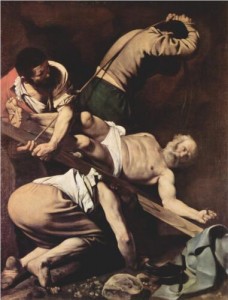 Crucifixion of Saint Peter, by Caravaggio 1601[/caption]
Crucifixion of Saint Peter, by Caravaggio 1601[/caption] - Jesus, in John 13:34, commands his disciples. What has he commanded us to do?
- How is Jesus' instruction to love like him (laying down your life for others as he has laid down his life for us) a gracious thing?
- No one perfectly loves like Jesus, and that is why we need to continually be reminded that we are rooted in his sacrificial, complete and perfect love for us (Ephesians 3:14-21). When have you seen a local church love like Jesus, laying down its life for the sake of others? What opportunities does Crossroads have to love others like Jesus?
God's Tricky but He's Good - Genesis 32:22-32
[caption id="attachment_4167" align="alignright" width="300"]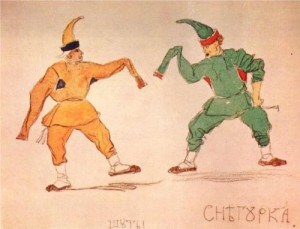 Jesters by Viktor Vasnetsov, 1885[/caption]Questions for Conversation
Jesters by Viktor Vasnetsov, 1885[/caption]Questions for Conversation
- What has God already promised Jacob according to chapter 28:13-15?
- Who else did God make these promises to in prior chapters of Genesis?
- How do these promises line up with the way God set up human life at creation (see Genesis 1-2).
- Read chapter 32:1-21.
- Who is Jacob afraid will attack and kill him? Why would Jacob be afraid of this? (Hint: see Genesis 27)
- Read 32:22-24
- Who do you think Jacob assumed the man was who attacked him in the night (see v. 24)?
- Read 32:25-30
- Who does Jacob realize it is in v. 30?
- Some people wonder how God, who cannot be seen and is a Spirit, can physically wrestle Jacob. Hosea 12:2-4 explains that an angel wrestled with Jacob. This is common for an angelic emissary of God to be God’s representative
- This was tricky of God to lead Jacob (and the hearers of Genesis) to think that it was a man who wrestled with him. But through this tricky attack God accomplished a few things:
- God can and does act shrewdly (withholding information) – he can be tricky.
- God is committed to his ancestral covenant promises to Jacob and is willing to act tricky to make that known. Do you remember how the putting Jacob’s hip out of joint indicated God’s commitment to keep his promises? (hint: see Genesis 24:1-3).
- Jacob’s tricky ways can be employed for the sake of God’s mission too. Do you remember how God helped Jacob to act shrewdly with Esau? (hint: see Genesis 32:1 and the meaning of “Mahanaim” in the ESV margin note and compare with what Jacob does in 32:7
- How was Jesus’ crucifixion the greatest trick that God ever played?
- How did that shrewd move by God fulfill his ancestral covenant promises to Abraham?
- How is God tricky in 2 Thessalonians 2:9-11?
- How is God’s trickiness employed for the sake of the covenant promises he has made to Christ’s people? How is his action performed for the sake of good?
- C.S. Lewis wrote of the Christ character in the Narnia series that “God is not safe but he’s good”. What do you think he meant by that? Does that help you understand how God can be tricky but also good?
- Why do we need the Bible to constantly expand and re-align our understanding of who God is toward us and others?
- Can you tell the group a story from your life when having your horizons expanded regarding Christ or the gospel really made a difference?
- God is obviously very serious about keeping his promise to Jacob, even giving him the enduring reminder in his hip joint.
- Do you believe that he is as committed to bring about salvation in the life of the church today? Where are you encouraged by what you see happening in the global, national or local church?


